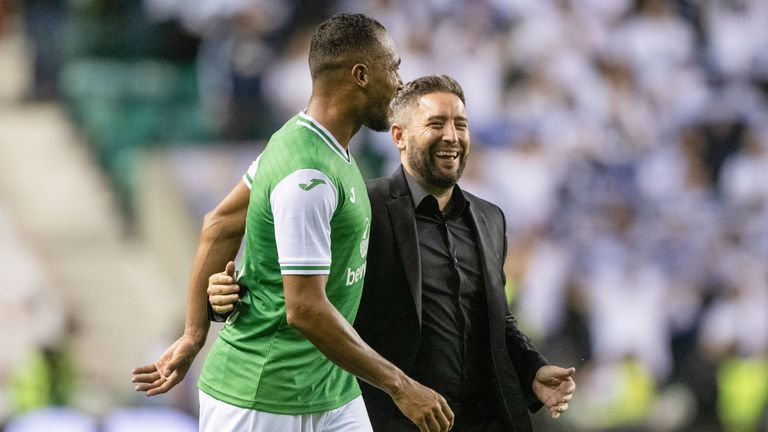After beating teams from Andorra and Switzerland so far, it is Aston Villa next for Hibernian in Europe, and Lee Johnson will be counting on the support of his well-travelled assistant manager. Adam Owen already has experience on three different continents.
The Welshman has held roles with Seattle Sounders, Hebei China Fortune, been an assistant with Servette in Switzerland and the manager of Lechia Gdansk in Poland. A former fitness coach with Celtic and performance manager at Rangers, he knows Scotland too.
“There is always a culture shift when going from Eastern Europe to China to Major League Soccer,” Owen tells Sky Sports. “But there are also similarities. It is interesting. I think that stems from the sharing of ideas and players flowing between countries.
“I was always told that you cannot work like that in MLS, you cannot work like that in Poland, you cannot work like that in China. The resistance comes from those already there. ‘This is what we do. This is what we have done for years.’ People do not like change.”
It is partly why he is relishing working with Johnson. “My background in sports science lends itself to a more modern approach and Lee is very modern in terms of his tactical principles and style. My job is to underpin that with a scientific justification.”
Owen, 42, has a nuanced interpretation of what modern means. Many years ago, he recalls spending time at the famous Milan Lab with Carlo Ancelotti. “Far and above anything that I had ever seen in terms of data collection and the link with physiology.”
More recently, he has worked with Benfica and Lech Poznan, both of whom have their own Skills Lab – a 360 degree virtual reality training tool. “You can place players back in that moment and reinforce the learning process through technology,” he explains.
“That technology has become fundamental to player development because you cannot always do the work during a recovery period. There is less time on the grass. Maximising technology, training the brain can make the difference without risking injury.
“To me, modern means keeping up to date with the latest trends in the game. Modern means having your finger on the pulse, using data on opposition, analysing strengths and weaknesses, the use of in-depth analysis to identify trends in the opponent.”
But despite his background – he has a PhD in sport and exercise science and coaching from the University of Lyon – Owen has some concerns about the changes in the game. Injury rates in football have not declined despite greater understanding of the science.
“I do not want to sound old school but there was no red zone back in the day – you spent all pre-season in the red zone. There was no testing and monitoring. Before then, you worked to the limit every day and from that came a level of robustness.
“There is an argument to say that coaches can become scared about pushing players too hard because they are scared of a player getting injured. It is about finding that balance because the only way of making players better is by pushing them.
“I think we have to be very careful with academy age-groups not to undercook players to the point where they are getting to the elite level and they cannot handle it because they have not got that robustness because we are too scared of what the data is saying.”
Owen is satisfied they have the balance right at Hibs, pointing to a strong finish to last season that secured European football.
“You can only do that if players are in the right frame of mind and capable physically of pushing on. We were mindful of that throughout the season, trying to get that balance between rest and recovery, and our players were fresher at the end.
“There were just a lot of changes that were needed not just in terms of recruitment but in terms of putting in a strategy, a methodology, a way of working. People are looking for a quick fix but it just takes time. There is never a quick fix with these things.
“It was about elevating the intensity a bit. Having a specific way of working irrespective of results that was focused performance over a long period of time. If you change things based on results you are always looking for you are never getting that consistency.
“Lee has been brilliant at sticking to the process and trusting it will come good. If you put something in place and then do not win for three or four games, people want to revert. But it takes time. Just from a scientific point of view it can take six to eight weeks.”
The hope is that Hibs can build on that work in the coming season. Defeat in the first leg to Andorran club Inter Club D’Escaldes was an inauspicious start but a resounding 6-1 win in the return leg put that right. Going on to see off Luzern was an impressive follow-up.
That has set up this showpiece occasion against Aston Villa. One to remember for Owen, a man whose own interests remain eclectic. He continues to be heavily involved with the International Soccer Science and Performance Federation, providing lectures.
“There are people from all over the world involved,” he says. “There is a course on injury prevention that is delivered by Boca Juniors’ doctor. You could never sit in a room and get lecturers from Benfica, Real Madrid and Chelsea. You can do it there.”
Hibs have lots to do to if they are to progress to the group stage of the Europa Conference League let alone mix it with some of the biggest clubs on the continent. In the meantime, they are benefiting from a coach in Owen with a rare blend of experiences.



